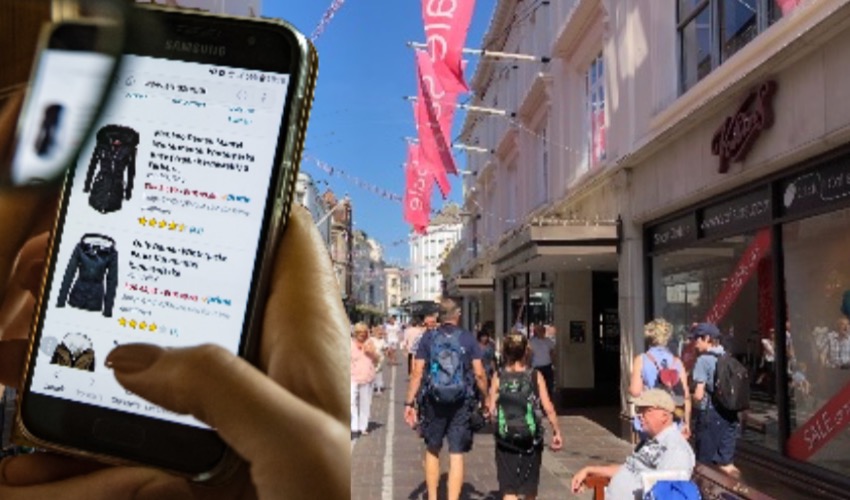


Online shopaholics and less frequent Amazonians alike were this week warned that the cost of their virtual baskets is soon going to rise – but why?
Express digs into the detail of the Government’s ongoing battle to claim more GST on online shopping, and examines its ‘workings out’ in setting a new £60 threshold…
The recently published Government Plan covering 2022-2025 included a new measure in 2023 to reduce the threshold above which GST is paid on internet purchases from £135 to £60.
It means that, for instance, someone buying a £61 item online up to 31 December 2022 will pay just that (excluding any extra costs like postage), but from 1 January 2023 they will pay £3.05 in GST on top of that.
Most islanders now carry out as least part of their shopping online, the majority of those using big internet retailers or marketplaces like Amazon, eBay and ASOS.
The other big change announced this week is that these big retailers will charge GST at the time of purchase and send the tax onto Jersey’s exchequer.
The agreement has made it possible to lower the threshold, the Government say, going some way to levelling the playing field between online and locally based retailers.

Pictured: The Government say they want to 'level the playing field' between online and locally based retailers.
Internet shopping has been rising exponentially over the past few years and this only increased during the pandemic. At Jersey Post, inbound parcels grew as a percentage of revenue from 10% in 2019 to 25% in 2020, yet this increase was only a subset of the growth across the Island with at least seven other parcel carriers now operating in Jersey.
A report by Revenue Jersey that underpinned the Government’s decision to lower the ‘de minimis’ limit has just been released, allowing islanders to see the rationale behind this revenue-raising measure.
The existing GST 'de minimis' level - the price at which GST is charged on goods imported for personal use dropped from £245 to £135 in October 2020. It is not a ‘tax relief’, the Treasury say, but instead was created to ensure that tax on personal goods was only collected when it represented value for money to do so.
However, these thresholds are coming down across the globe, and both the UK and EU removed theirs earlier this year, which prompted Jersey to carry out its own review.
Revenue Jersey estimate that there will be a one-off capital cost of £186,240 next year to bring systems online. They also suggest the Customs ‘CAESAR’ online portal is improved to make it more consumer friendly.
They estimate that there will be £75,000 worth of running costs next year and them ongoing running costs of £300,000 in 2023, £315,000 in 2024 and £331,000 in 2025. This will mostly fund extra Customs officers who will have to administer the lower de minimis threshold and capture the GST from manifested goods imported into the island.
In its first year – 2023 – Revenue Jersey think that the new measures will bring in an extra £1,481,909. This will rise to £1,556,004 in 2024 and £1,633,804.
Minus the costs, the change will net the Treasury an extra £3,464,477 between next year and the end of 2025.
Revenue Jersey estimate this to provide a 5:1 return on investment, meaning that it costs £1 to get £5 in. This not only makes economic sense, they say, but also further reduces the inherent discrimination between goods bought online and locally.
Revenue Jersey believe that the existing provisions banning the separate mailing of single consignments that are received on the same day from the supplier for the same importer are sufficient for the future. They say that charging at the point of sale by larger retailers should reduce the problems currently associated with the practice of spitting orders, or ‘disaggregation’ as they call it.
The Jersey Consumer Council have created a list of firms it says charge VAT. These include: Accessorize, ASOS, Bon Marche, Boots, IKEA, Marks and Spencer, Edinburgh Woollen Mills and Studio.
Revenue Jersey concede that there are clear examples where some retailers - usually smaller ones, sometimes selling through marketplaces - do overtly invoice a VAT charge, although, if challenged, some will refund it.
This year, one Islander, Advocate Olaf Blakeley, is campaigning to stop ASOS charging what he says are the “outrageous” VAT-equivalent prices that the retailer charges.
The Revenue Jersey team says it has done work in recent years to discourage this practice but, they add, ultimately, the power lies in the hands of individual consumers not to buy at a price they do not want to pay.
This view, however, is rejected by the JCC, who say it is the Government’s responsibility to stand up to retailers.

Pictured: Revenue Jersey say that more Customs officers will need to be recruited but the extra revenue they help bring in will easily cover their wages.
Revenue Jersey say that, having examined the “top ten” offshore retailers by volume, only one of them charges VAT and that it does refund it on request. Three of the top ten do already charge GST and sent it to the Jersey Exchequer.
Revenue Jersey have found that some retailers seem to set a ‘retail selling price’ across the British Isles sterling zone which encompasses delivery costs and local taxes.
This ensures that goods are sold at the same price whether bought in Jersey or the Shetland Islands and reduces business costs by removing differential pricing.
The Government says this may well indicate that the introduction of Jersey GST at the point of sale is likely to absorbed within that British-Isles-wide pricing approach and may therefore not necessarily result in increased retail prices.
The Government plan to introduce legislation making it compulsory for internet retailers with an annual turnover above £300,000 to register for GST. Most of the bigger retailers have told the Treasury that they would be happy to comply, as they now have to anyway in the UK and EU.
The retailers’ key requests, apparently, have been that Jersey seeks to mirror EU/UK legislative terms and definitions to enable the smoothest operation of their systems; and that Jersey gives at least one year’s legislative notice of change so that retailers can invest and implement changes. Hence the 1 January 2023 introduction date.
For commercial confidentiality, the Government is tight-lipped on which retailers they have spoken to but it is likely to include some of the best-known operators. According to data website Datanify, the top-ten UK internet retailers are:
1. Amazon UK
2. eBay UK
3. ASOS
4. Argos
5. Next
6. Tesco
7. Marks & Spencer
8. Asda
9. Screwfix
10. B&Q
Other popular sites include John Lewis, SportsDirect, boohoo, Ocado, IKEA and Wayfair.
Items currently costing between £60 and £135 will go up by 5% from 2023 as GST will be added – either by the internet retailer or marketplace if they’re registered with the Treasury to pay GST or by Customs officers when the goods arrive in Jersey – as the threshold will fall. For items over £135, however, prices should, in theory, stay the same; however, Revenue Jersey believe that fewer items are likely to be missed by Customs if GST is automatically added.
Helping Customs is a promise by Royal Mail that all goods coming into Jersey will be fully manifested – including the value – from next spring. Revenue Jersey say this potential “game-changer” will, if appropriately resourced by Customs, allow the capture of more GST. But they add that it is impossible to quantify the potential revenue at the moment.
That is another concern of the JCC, who in their submission to a Scrutiny panel looking at issue wrote: “We accept that, due to economies of scale, global companies like Amazon are able to offer better prices, but many smaller UK retailers often provide more competitive prices than be found locally. If these options are taken from consumers, the Island returns to the ‘captive market’ it was before internet shopping became the norm.”
The Revenue Team say that this risk had always been the reason why Jersey didn’t forge ahead with requiring large retailers to collect GST on the Treasury’s behalf. However, with the EU and UK requiring them to do this this year, they argue that the benefits of selling to Jersey customers are “increasingly likely” to outweigh the marginal cost of tweaking their systems to collect GST.
The Treasury say they did consider this but has rejected removing the de minimus completely.
Although GST collection costs will fall if large retailers charge it on Jersey’s behalf, it will still take time and money to collect the tax from smaller retailers, and reducing the threshold to zero could mean that the extra effort actually costs more than the tax being brought in.
Revenue Jersey think that setting a £40-£60 de minimis level will still achieve at least a 4:1 return on investment, so that it costs £1 to collect £4. A zero-rate could also slow down the processing of lower value parcels. The threshold also allows family gifts to be sent to islanders without incurring GST.
Drinking, driving, smoking and online shopping to get pricier
Treasury in talks with online retailers over VAT issue
GST looms on Guernsey's horizon following tax review
Amazon "onside" with collecting GST for Treasury
Three new Government roles to deal with extra GST work
Comments
Comments on this story express the views of the commentator only, not Bailiwick Publishing. We are unable to guarantee the accuracy of any of those comments.